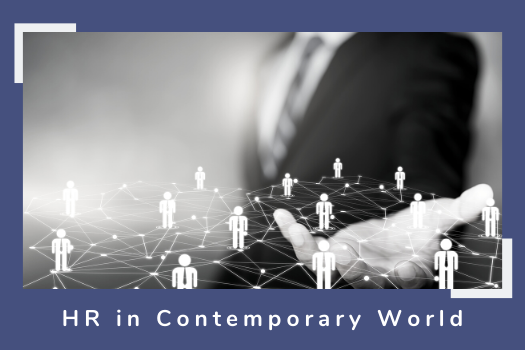HR in the Contemporary World
Employee Engagement, Employee Relations, Rewards and Recognition
HR has evolved remarkably over the years. With constantly changing dynamics and technologies, it became imperative for HR to upgrade and embrace a wide range of roles and responsibilities. Since every organization’s goal is - survival, making profits, gaining market share or gaining recognition, it posed a great challenge for HR departments to meet these expectations while continuously innovating and reforming the traditional practices. In attaining these goals, the HR interventions today are focused towards building a client base, revenue retention, and healthy client’s portfolio/balance sheet.
Gone are the days when HR was reckoned only as a personnel manager. Today, HR can safely be quoted as a revenue generator. HR in true spirit lives in the soul of wealth creation by attracting the talent. It is the outcome of investments that an organization makes in enabling the people and resources together to accomplish work. This defines the character of the organization and the stability of which, over a period of time becomes difficult for the competitors to emulate. The onus rests with the HR and its alliance with the management in establishing this strategy. There has been a substantial and dramatic evolution in the past decade, shaped by factors like technological advances and a new generation of workers with a zest of competitiveness, resulting in placing HR from insignificance to imperative role. HR has moved from back seat of transactional support to the business enabler and strategic partner. The paradigm shift dictates that HR must first clearly understand the purpose of the organization and then work towards defining the culture. An identifiable culture attracts employees, gives them a sense of purpose and offers a basis for participation in decision-making. HR is one department that collaborates with other company departments to drive overall growth and directly align with business objectives.
In today’s world, communication and collaboration is core to HR functions. Mostly HR drove initiatives directly concerns with employees at large and their retention, development, hiring and employer branding. With robust strategies and goals, HR functions not only attract and retain best talent but also drive performance. Since employees are the brand ambassador and spokesperson of organizations. HR now invests time in building a culture of values, a culture of learning and culture of engagement. HR success has to be best measured by working on best returns connecting with organizational goals. KPI’s have to be quantifiable by means of showing results. All KPI’s which connect to bigger and smaller organizational vision is useful viz. Employee productivity, Employee turnover, Employee engagement level, time and cost to hire and ROI of L&D programs. The most significant contribution one has to do in an HR role is to change the thought process, ensure focused vision, standardize the process, delegate, trust and accept other’s decision because now entrepreneurs don’t want to go with system-centric approach only, rather prefer people-centric approach.
Usually, non-adherence of policy/ SOP, solo decisions without consultation of HR, escalation of an issue at any hierarchy, performance measurement, rewards and recognition, employee relations are some common issues that pop up from other departments. Hence, HR must ensure a good working environment that dispenses clarity of role and goal, promotion and progression, rewards, safe and hygiene workplace condition, cultural blending, trustful leadership, training and development of people, etc. To achieve organizational goals, HR can start developing PDPs/ IDPs for key roles. It is possible only when a company understands and formulates a vision that employees are key assets of an organization and by developing their personal ability, an organization can lead them towards professional and organizational goals.
The HR leader now needs to work both within the HR group and with the organizational leaders to reshape everyone's expectations of what HR can and will deliver. The success of the change will depend upon HR's ability to meet the real needs of the organization and the credibility it develops. One of the ways that HR can provide value is to understand how changing environmental, organizational, and workforce factors will likely influence the business, anticipate the associated HR needs, and be prepared to deliver appropriate solutions to meet those needs. By maintaining a focus on workplace trends, HR can prepare to evaluate the impact that particular changes are likely to have on an organization's people and processes and be prepared to work with the business leaders to decide how to respond by being ahead of the curve.
An HR group that will be successful in the contemporary world is the one that is responsive to the changing needs of its client organization. Responsiveness in the changing world of work will require being flexible as the organizations will surely change and so will their needs and priorities. In addition, traditional activities and processes may not be sufficient to meet the unique needs of the future. HR leaders will have to rely on the creativity of their groups to achieve effective results. Since, increasing globalization of the market is creating a need for both flexibility and creativity as businesses try to succeed in new locations, with a new workforce, and with new customers - HR is emerging as a robust backbone.






